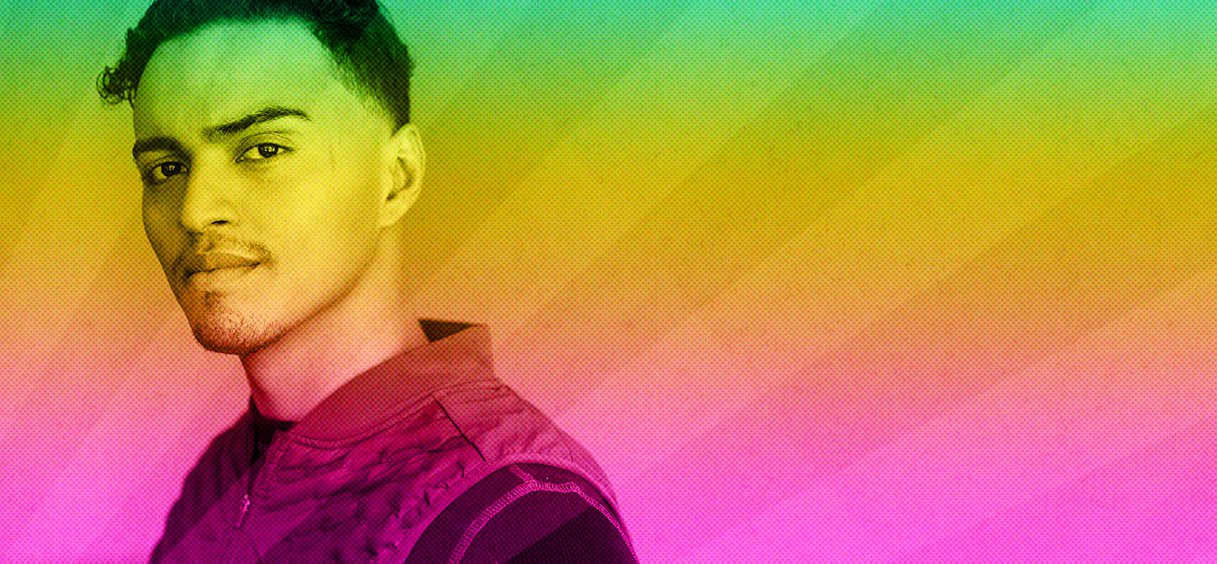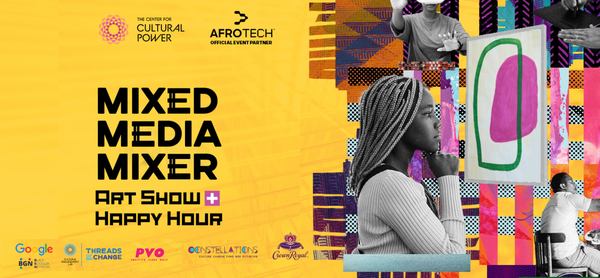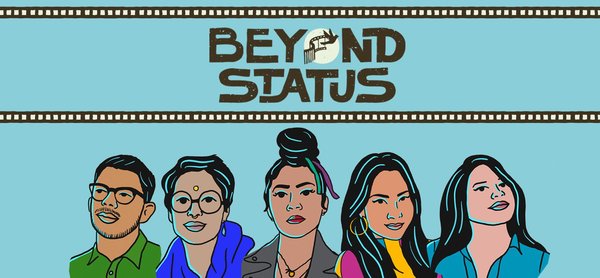
Tonatiuh, On Curiosity and Expression
TONATIUH is a native Los Angelino, a proud child of Mexican immigrants, an activist, and storyteller. In partnership with The Center for Cultural Power, Tonatiuh has produced a series of videos entitled The Masculinity Project, featuring Jesús Iñiguez, Tommy Shepherd, and D'Lo. The goal of this project is to deconstruct and reshape our collective understandings of masculinity and manhood through the art of storytelling.
We sat with Tonatiuh to discuss his own story and experiences as shared in his episode for The Masculinity Project.
Editor’s note: This conversation has been condensed and lightly edited for clarity.
How do you define masculinity and manhood?
Oy, starting off fresh!
Honestly, it’s difficult for me to answer that question. Any answers that I come up with are just characteristics that I think all people should have irrespective of gender. For myself, when I think of men in a positive light, I think of people who honor their commitments, are honest, supportive, kind, go for what they want, calm, and patient. Those are characteristics that I’d want to embody. But again, all of those adjectives I would want women to have as well, so It’s unclear to me how to define it.
What inspired you to participate in this project?
I grew up in a beauty salon, so talking came natural to me. My work as an actor comes from a place of exploration - wondering what makes people who they are. I was asked to foster conversation with four men of color who agreed to open themselves up around the theme of masculinity. I treated this like I would any acting job: live in their world from a place of non-judgement. I allowed them to talk and tell me their stories and I would hear the narratives and ask questions so they would begin to see parallels or patterns within their own lives. I think as men, we are not encouraged or have the space to be vulnerable. You can easily shirk off feelings of discomfort.
Did you learn anything in the process of interacting with them?
I learned that even if your father wasn’t in your life, you still [share] similar themes with them, which is kinda spooky. It’s like a phantom limb. It’s not really there but it still itches. [The process] was really enriching. I have the privilege of constantly being in this kind of dialogue inside my brain and having a support system [of friends] who also like to engage this way. For us, to navigate these waters and to think in this way comes really second nature, so it was touching for me that this felt really special and new to these gentlemen because I think I had been taking it for granted that this was just the space that I operate from.
Do you feel like your experiences gave you tools that these other folks didn't necessarily have?
I think that anybody is capable of this kind of dialogue. I’ve been on a self-help healing journey for at least seven years, so going to events and workshops and my training at USC in analyzing characters has strengthened me with questions to ask, and ways to ask questions that are technically invasive but presented as non-threatening. My thirst for curiosity is something I’ve been developing for years.
In your story you talk about your femininity and how it was celebrated at home. As you moved through these different iterations of gender expression, what role did your family play?
It’s a mixed bag. Because of how bullied I was, from eight to about twelve or thirteen, I was really aggressive. I felt like I was constantly being attacked and I didn’t know why, so I became hypersensitive to any form of criticism. Instead of retreating, and being woe is me, because I was tired of crying, I was like “I’m gonna fight you.” I think my family learned to leave me alone. Eventually, [my family would say] “that’s who he is, we just accept that.”
They were never cruel, but in my family we have a culture of poking fun at each other. Eventually, I think I got to a place where I could be celebrated because I was celebrating myself. When I was younger they would make fun of me as they would anybody, but when I became aggressive, [the response] was “okay, he can’t take a joke.” Now, people make a joke, but I can see where it's coming from. If the joke ever goes too far though, I call it out or act dumb and ask "I don't get it, why is that funny?" Oftentimes, they realise that the butt of the joke is problematic; or at the very least they don't say it around me.
You also talk about the turbulence you encountered at school and how it resulted in a desire to “change everything about yourself.” What did community look like for you when you were in that process of assimilating into masculinity?
It wasn’t an assimilation into specifically masculinity, it was an assimilation into cultures that rejected me. I just started observing others and thinking, “I could learn to talk like that and dress like that.” I became a bit of a chameleon in that regard, jumping from friend group to friend group and exploring those different facets. Women were always my in, and we would often bond over similar hurt. I could never fully reach the traditional hyper-masculine boys because there was no in for me, but it was the women with whom they associated that I could blend in. I was able to try on different hats and modes of expression, but they were always coming from a place of “not enough-ness.” It wasn’t until I met Michael (a high school friend) that I could really say, “I will be femme and loud and wear that colored shirt and straighten my hair and pluck my eyebrows, and I don’t give a f*ck.” After knowing I could do that I realized that that wasn't fully me either and kept oscillating until I found my natural state.
What resonated for me about your story was the role Michael played, inspiring your healing and helping you reconnect with your femininity. Could you say a bit more about Michael and the communities/spaces that brought you in?
I came out really young, thirteen or fourteen, but I was still insecure. Michael, who had two lesbian moms and he was also queer, really brought me in. They took me to my first pride in West Hollywood in 2014. I remember sneaking out of the house to go to TigerHeat when I was 14. It was Jennifer Lopez night, it was fun, we danced, nothing crazy. It made me realize, “Oh, this is real life, there’s other ways of being. Michael was really a formative experience for me.
Entering the theater group in high school was also formative and healing for me because I had so much to express. I was weird and queer and that was a space that felt safe. There were other weirdos there who’s inner child was still alive and they weren’t trying to front that they were an adult and eager to grow up too quickly, which was nice. The fraternity was a weird fit because I was confident in my queerness and wasn’t trying to go into the closet or anything like that, but that’s where I tapped into some of the more masculine aspects of myself today. I love competition and I love drinking someone under the table. [Laughs]
I don’t know if you’re familiar with the concept of dialectics, which is holding two seemingly opposing things at the same time and being okay with that. In certain spaces and in certain instances, I’m going to be this way. Put me in the room with the dolls and it comes out and I’m ready. Try and come at me with some shade and I’ll shade like a drag queen. And that goes back to the end of my video: be like a painting or a koi fish, be multifaceted.
By the end of the video, you expressed joy and freedom in being able to move freely between masculinity and femininity. How did you find peace within masculinity and do you have any advice for young people on how they can do the same?
I was putting the expectations on me. I was disappointing me in trying to fulfill something for me. Recognizing that I was enough and how I presented was enough and really focusing on the legacy of me was more important than fulfilling some quota that I inherited. Stepping out of myself and seeing myself as a character in other people’s lives, I could ask “how do I want to show up for people, what is the Tonatiuh experience?” That, to me, was more interesting than how I dressed or what I looked like. That’s boring.
So, if you’re feeling pressure, I would encourage you to just explore everything. I think that’s fun, and you’ll be surprised by the things you end up enjoying. Try it twice. We’re all gonna die anyway.
Watch Tonatiuh's story and other videos from the project below!


